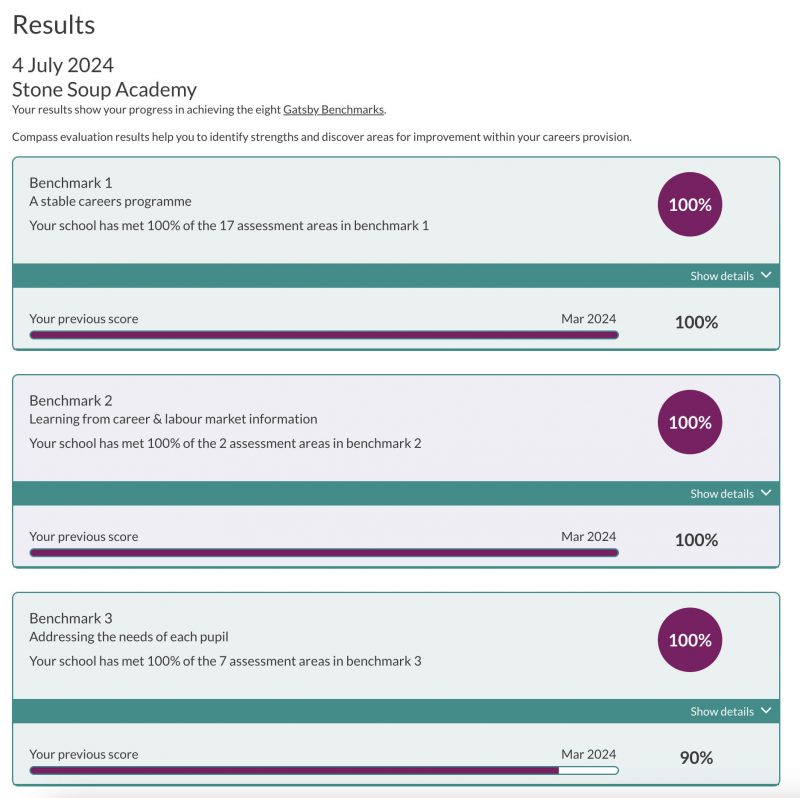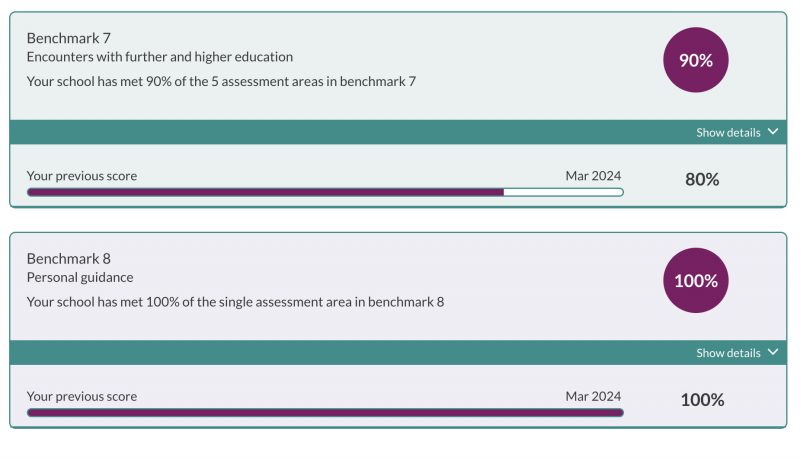Bulletin:
Term ends on Thursday, 24th July at 12PM.
Students return on Thursday, 4th September at 9AM.
OFSTED OUTSTANDING AS OF JUNE 2025
Bulletin:
Term ends on Thursday, 24th July at 12PM.
Students return on Thursday, 4th September at 9AM.
OFSTED OUTSTANDING AS OF JUNE 2025

We are proud to be OFSTED OUTSTANDING 2025. *** TES 2020 winners of Alternative Provision school of the year ***

Stone Soup Academy will provide places for students who are outside of mainstream education. Students are referred by schools and local education authorities from across the East Midlands.
Parents cannot ‘choose’ Stone Soup Academy as an option for secondary education in the first instance as we are set up to deal with learners at risk of exclusion.
For more information, please view our Admissions Policy.
Whilst we do not have open days, potential students are invited via their referrer to visit the Academy for a tour of the site with their parent/carer.
Referring schools or Organisations should contact The Stone Soup Academy Admissions team via the school’s main telephone number or send written enquiries via email.

We are proud to be OFSTED OUTSTANDING 2025. *** TES 2020 Winners of Alternative Provision school of the year ***
Stone Soup Academy focuses on engagement with education and reintegration with schools. The average time a student is with us is 28 weeks, and the courses offered to students reflect that. With this in mind, we offer GCSEs and GCSE equivalents in-line with the time a student will be with us, their starting point and alignment with the referring school’s needs.
Percentage of Pupils who achieved a 4-9 or above in English and Maths GCSE
Percentage of pupils who achieved a GCSE (or equivalent) at any grade
Percentage of pupils who achieved a pass in any qualification
Percentage of students staying in education or employment after key stage 4 (destinations)
Percentage of students who achieved a GCSE in English and Maths
Please find information relating to our curriculum
Please click here to read our Curriculum Statement
Click here to read our Curriculum Policy.
At the Stone Soup Academy we focus on supporting students with SEND through a range of support, interventions and differentiation.
The pupil premium is additional funding for publicly funded schools in England to raise the attainment of disadvantaged pupils of all abilities and to close the gaps between them and their peers.
Stone Soup Academy only receives funding for students who are on single roll with us; referring schools use their Pupil Premium Funding to send students to our academy and as such the funding is used to provide personalised education for the students in that way. We do not receive this PPF directly and assume that it makes up part of the commissioning fees to the Stone Soup Academy.
The PPF that we do receive directly, along with the commissioning fees, are used to personalise learning through incentives, specialist tutors, college days and other similar items. This has helped students improve their attainment and ensure that disadvantaged students do not experience barriers to their learning and development. We have also invested this into establishing a healthy eating programme at the school, ensuring the students have access to and knowledge about better nutrition.
Pupil premium statement 2024-25 Stone Soup Academy
written by Stephen Thompson SENDCo Assistant Principal
School overview 2024 -25
School name: Stone Soup Academy
Capacity 110
Proportion (%) of pupil premium eligible pupils 44/83- 52% September 2024
Academic year/years that our current pupil premium strategy plan covers 2024-2027. Reviewed and updated annually.
2024-2025- Stephen Thompson. SENDCo Assistant Principal.
Overview
Part A: Pupil premium strategy plan
Statement of intent
At Stone Soup Academy pupil premium funding goes directly to the referring school as all of our students are currently on dual roll.
Stone Soup Academy only receives a pupil premium transfer if the school has been given additional funding and requests that the academy purchase something for the student on their behalf.
Stone Soup Academy currently has no additional pupil premium funding transfers, we will continue to raise pupil premium in discussions with referring schools and respond to any requests for purchases to be made on their behalf.
At Stone Soup Academy our students have a variety of needs and often complex educational and personal histories. We support our students at an individual level and seek to specifically target any areas of concern with specific tailored interventions to each individual. In the case of pupil premium, we may need to approach the referring school for additional funds, however, this is often not the case due to the extensive provisions and outstanding Quality of Education put in place for all of our students. For example, personal coach, SEND specialist intervention, small class sizes, and access to technology.
Stone Soup Academy provides an outstanding holistic approach to education for all our students (OFSTED 2019). Our vision, of creating unimagined futures, is rooted in a desire to enable students to reach the highest levels of personal development, creativity and achievement. The academy provides a warm and caring environment that nurtures our values (respect, aspiration and positivity) to build self-esteem. This platform enables students to engage in the curriculum in its broadest sense, by fostering a genuine love of learning. As 21st-century citizens, students are encouraged to be collaborative but also take control of their own education and develop independence that is the foundation for lifelong learning. Stone Soup is an inclusive academy that aims to meet the needs of every student, supporting them in fulfilling their ambitions and being the best they can be, regardless of background, special needs or disability.
Challenges
This details the key challenges to achievement that we have identified among disadvantaged pupils.
|
Challenge number |
Detail of challenge |
|
1 |
Our assessments show that disadvantaged pupils generally make less progress from their starting points when entering an alternative provision such as our academy. Whilst the types of barriers to learning and the difficulties disadvantaged pupils experience vary, however English and Maths remain a key focus. |
|
2 |
Research, assessments, observations and discussions with pupils show that disadvantaged pupils are generally more likely to have language comprehension difficulties and more limited vocabulary compared to non-disadvantaged pupils. This impacts on their ability to access the curriculum. |
|
3 |
Research, assessments, observations and discussions with pupils show that disadvantaged pupils are generally more likely to have less opportunity to increase Cultural Capital. |
|
4 |
Research, assessments, observations and discussions with pupils show that disadvantaged pupils are generally more likely to have less opportunity to increase access to careers and go on to gainful apprenticeships, college and work. |
Intended outcomes
This explains the outcomes we are aiming for by the end of our current three-year strategy plan (2027/28), and how we will measure whether they have been achieved.
|
Intended outcome |
Success criteria |
|
Improved reading comprehension among disadvantaged pupils. |
Reading comprehension tests demonstrate improved comprehension skills among disadvantaged pupils and a smaller disparity between the scores of disadvantaged pupils and their non-disadvantaged peers. |
|
Improved access to vocabulary at a variety of levels and literacy intervention. |
Teacher reports and class observations suggest disadvantaged pupils are more able to access a variety of vocabulary. Interventions show literacy intervention progress for disadvantaged students. |
|
Improved access to Cultural Capital and experiences which enhance this. |
Teacher reports ,class observations and cultural capital tracking suggest disadvantaged pupils are more able to improve their Cultural Capital. |
|
Disadvantaged pupils feel better prepared for career progression and post-16 opportunities through mentoring, work experience and various opportunity. |
All disadvantaged pupils can access high quality work experience and careers mentoring. |
Pupil premium strategy outcomes
This details the impact that our pupil premium activity had on pupils in the 2023 – 2024 academic year.
Summer 2024 GCSE results showed that children eligible for Pupil Premium and those not eligible are in line in terms of progress and attainment.
Destinations of our previous cohort show that of 16 out of 16 students have gone to college, work or apprenticeship.
Nottingham college open-days
Confetti College open days
Confetti college college courses



100% of students receive advice and guidance interviews from Jordan who has a Level 7 Diploma in Careers Guidance and Development.
100% of students last year received conditional offers from their desired destination.
Students can access work experience opportunities with this login through the Futures website:
username: StoneSoupStudent
password: Stonesoup123
|
Destination Data 2020-2024 |
|
||||
|
Destination |
2020 |
2021 |
2022 |
2023 |
2024 |
|
|
|
|
|
|
|
|
College/FE |
33 |
36 |
29 |
20 | 28 |
|
Apprenticeship |
0 |
1 |
1 |
0 | 0 |
|
Employment |
2 |
1 |
2 |
6 | 2 |
|
NEET |
0 |
2 |
3 |
7 | 2 |
Our destination data shows a consistent low number of learners who become NEET (Not in Employment, Education or Training).
We work closely with Futures to target those learners we feel are most at risk of becoming NEET.
Our Careers information can be accessed through our Careers Leader Jordan Senior and Jordan can be contacted via email: jsenior@stonesoupacademy.org.uk or via telephone on 0115 8221834.
We review the careers programme annually.
Click to view our careers policy SSA Careers policy .docx
George Spencer Academy “They provide excellent wrap-around care to ensure our students achieve their academic goals but also develop as young adults to prepare them for post-16 success.
Governors: Kerrie Henton (Ex-Officio), Barnaby Mulholland (Safeguarding governor), Toni Le Gallez (parent governor), Richard Elston (Co-opted), Claire Knee (Co-opted), Rueben Williams (Member Governor), Nigel Best (LA Appointed trustee).
Please refer to the Governance page for further details regarding the governing body.
If you require any copies of the information above, please contact the school directly and these will be provided free of charge. Any enquiries should be addressed to the Principal, Kerrie Henton.
Please see Our Mission in conjunction with the Equal Opportunities for Student Policy.
We do not require payment from parents/carers for any aspect of the services we provide. Lunch, trips and activities are all provided at no cost to parents.
I am 16 years old and I was excluded from school when I was 13 because I found it difficult to behave in school. I wasn’t sure what was going to happen to me and that made me feel nervous. I arrived at Stone Soup Academy and I haven’t looked back. My attendance is now 100% and I am doing really well. I study media, construction, multi skills and sport alongside GCSE’s in English and Maths and I’ve already achieved 2 qualifications in level 2 Media and level 1 hairdressing. Stone Soup has really had a positive impact on me by changing my behaviour, the staff try to help me in as many ways possible. They are polite and it is very different to mainstream. I never wanted to go to my mainstream school and now I look forward to coming to Stone soup and I come all the time. We always shake hands when we arrive and leave.
The teachers always discuss the future and what I can do which really helps.
We earn money for our behaviour and attendance which is just like the real world.

I have really enjoyed my time at Stone Soup and to be honest I will miss it when I leave but without Stone Soup I wouldn’t have become the person that I am today, a person with a bright future.
By the age of 14 I was already a failure. At least in the eyes of the education system. In mainstream school you are stuck in classes of up to 30 people and only one teacher. So when you want help you have to wait for the teacher to come round. This would take ages and so you would just give up waiting. They were some examples of the problems facing students in mainstream students into today’s world.
I attended a mainstream school in Nottingham, in my opinion the biggest issues were, there wasn’t enough staff to be able to support all the students in the school. As well as having packed corridors in between lessons made it very tight. This made the school feel like a very stressed environment for both staff and students. Also the school days are very long and you have to 5-6 lessons a day witch are about an hour long and still get given homework, this leaves no down time for students.
However ever since i have joined Stone Soup Academy school life has become a lot more easier, for example its first name terms with all teachers and instead of just walking around a cold field at mainstream you play FIFA and pool at break and lunch which can improve friendships and make it a better learning environment for both staff and students. Also class sizes are 10 times smaller than mainstream with no more than 10 students in a class. This means that students get help a lot quicker an therefor learn more in a shorter amount of time.
If I had to compare the two types of education the main differences would be that Stone Soup has a lot more relaxed feel to it than mainstream which results in people both staff and students feeling more able to concentrate on what they need to do. This is why at Stone Soup you can get work done a lot quicker and still feel like you’ve learnt something.
To conclude I think that if every mainstream changed the way they managed situations it would feel more relaxed and therefore student results would increase hugely. The problem is education is always getting budget cuts and are still expected to give students more support.